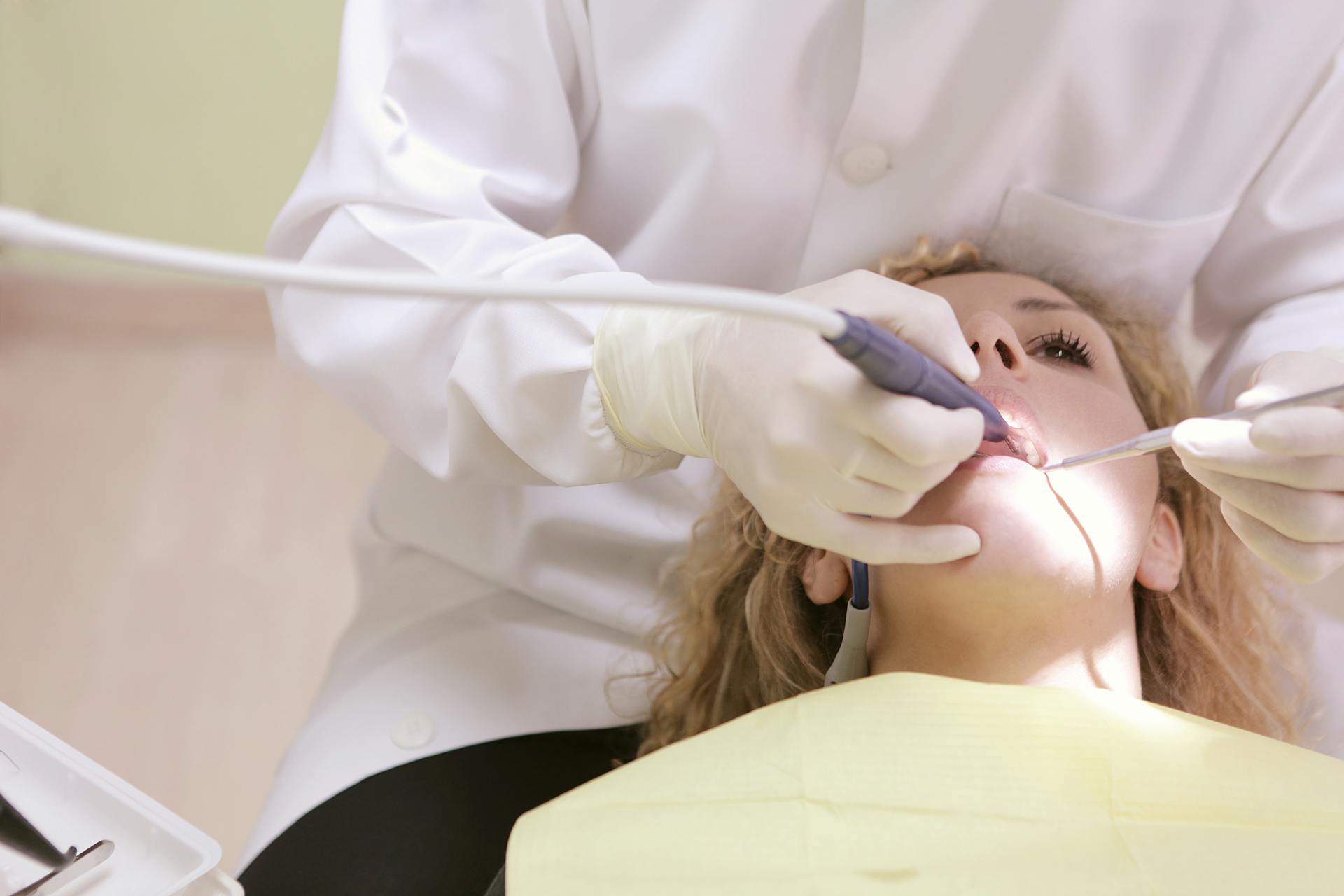
As a self-employed individual, you're likely used to taking care of your own benefits, but dental insurance is one area where you may not have considered the options.
Dental insurance for self-employed individuals can be purchased through various channels, including the Affordable Care Act (ACA) marketplace, private insurance companies, and professional associations.
Many self-employed individuals opt for a dental insurance plan that covers 100% of preventive care services, such as routine cleanings and check-ups, with no out-of-pocket costs.
Dental insurance premiums can vary widely depending on your age, location, and the level of coverage you choose.
You might enjoy: Long Term Care Insurance Deduction for Self Employed
Benefits of Dental Insurance for Self-Employed
Having dental insurance as a self-employed individual can be a lifesaver, literally. Everyone, regardless of their profession, should visit the dentist regularly.
Regular cleanings and exams can be covered, and partial coverage for more extensive treatments and procedures can be provided. This means you won't be slammed with a huge bill for a simple cleaning or an unexpected tooth injury or illness.
Self-employment can already create financial stress, but with dental insurance, you get peace of mind knowing you can take care of yourself without putting a strain on your finances.
If you're self-employed, you can deduct the cost of dental insurance for yourself, your spouse, and your dependents. You can do this by filing an adjustment to income on Schedule 1, line 17.
The insurance plan must be established under your business and can be either in the name of the business or in the name of the individual. This is a requirement to qualify for the deduction.
Cost and Deductions
The cost of dental insurance for self-employed individuals can vary greatly depending on several factors, including your age, location, and the type of coverage you choose.
There's no one-size-fits-all dental insurance plan, so it's essential to shop around and compare different options to find the best fit for your needs and budget.
Monthly premiums are just one cost to consider, as insurance plans also come with co-pays, deductibles, and coinsurance.
Here are some factors that impact your monthly premium:
- Your age
- Where you live
- Who insurance will cover (individual, individual + partner, family)
- Desired coverage for cleanings and exams (most cover 100%)
- Desired coverage for basic and major procedures (X-rays, sealants, oral surgery, etc.)
As a self-employed individual, you may also be able to deduct your dental insurance premiums from your taxes under certain conditions.
How Much?
Your monthly premium for dental insurance can vary greatly depending on several factors. Your age is one of the key factors that impact how much you'll pay each month.
Where you live also plays a significant role in determining your premium. Insurance plans can be more expensive in certain areas due to the cost of living.
The number of people you want to cover with your insurance is another important factor. You can choose to cover just yourself, or add your partner or family members to the plan.
Most dental insurance plans cover 100% of cleanings and exams, which is a great benefit. However, the cost of basic and major procedures can vary widely depending on the plan you choose.
Insurance plans come with various costs aside from the monthly premium, including co-pays, deductibles, and coinsurance. These costs can add up quickly, so it's essential to understand what you're getting into.
You might enjoy: Self Employment Health Insurance Cost
How to Deduct Costs
To deduct the cost of dental insurance, you'll need to itemize your deductions on form 1040 Schedule A.
Only expenses exceeding 7.5% of your adjusted gross income can be deducted, so it's essential to calculate this threshold first.
You can deduct dental insurance premiums as a medical and dental expense, but only if you're itemizing your deductions.
For most taxpayers, this means combining your dental insurance premiums with other qualifying medical and dental expenses to see if they exceed 7.5% of your AGI.
Self-employed individuals may have a different option, deducting dental insurance premiums under certain conditions as an adjustment to income on Schedule 1.
This means they can deduct their premiums even if they don't itemize their deductions.
Suggestion: Income Protection Insurance for Self Employed
Finding and Choosing Plans
Finding the right dental insurance plan can be overwhelming, especially for self-employed individuals who have more control over their coverage. You can browse and compare plans quickly and easily with Direct Benefits, and even enroll without waiting periods.
There are two main approaches to finding dental insurance as a self-employed individual: you can add a dental plan to your existing health insurance, or purchase a standalone plan. This gives you the freedom to choose a plan that fits your budget and meets your unique oral care needs.
Consider what services you'll need and whether you want to stick with a specific dentist, as you'll need to ensure they're in-network for the plan you choose.
How to Find Affordable Options
Finding affordable options for dental insurance as a self-employed individual can be a challenge, but it's not impossible. With a little research and comparison, you can find a plan that suits your budget and oral care needs.
Direct Benefits is a great resource for finding affordable dental insurance plans with no waiting periods. You can browse, compare, and enroll in plans quickly and easily on their website.
There are two approaches to finding dental insurance as a self-employed individual: within your existing health insurance plan or as a standalone plan. Consider what services you'll need and whether you want to stick with a specific dentist, as you'll need to ensure they're in-network for whatever plan you choose.
A different take: Personal Health and Dental Insurance
The Health Insurance Marketplace is another option for finding affordable health and dental insurance plans. You may qualify for financial help from the government, also known as a subsidy.
The Marketplace offers plans that cover essential health services and benefits, including preventive health check-ups, emergency services, and hospital stays. Some plans may also include dental and vision coverage as well as programs for chronic pain, diabetes, and weight management.
Here are the states that run their own health insurance exchanges:
- California
- Colorado
- Connecticut
- District of Columbia
- Idaho
- Kentucky
- Maine
- Maryland
- Massachusetts
- Minnesota
- Nevada
- New Jersey
- New Mexico
- New York
- Pennsylvania
- Rhode Island
- Vermont
- Virginia
- Washington
What Covers?
Dental insurance typically covers procedures strictly related to health and wellness, not cosmetic work.
Preventive care, such as annual cleanings, X-rays, and sealants, is usually 100% covered.
Most plans focus on preventive and basic care, and not all procedures are covered.
Basic procedures, like fillings, extractions, and periodontal treatment for gum disease, are covered at 80%.
Major procedures, such as crowns, bridges, inlays, and dentures, are covered at 50%.
The median annual maximum for dental insurance is $1,500.
Self-Employment and Insurance
Self-employment can bring financial stress, but having dental insurance can give you peace of mind knowing you can take care of yourself without breaking the bank.
You can deduct the cost of dental insurance for yourself, your spouse, and your dependents in the form of an adjustment to income, but only if you were self-employed and had a net profit for the year reported on Schedule C (Form 1040) or Schedule F (Form 1040).
Some states define a small group or small business to include self-employed individuals, making you eligible for other types of health plans than those listed here. You can find out more about what types of health plans you might have access to in your state by visiting your state government's website and the small business resources available there.
Related reading: Self Employed Health Insurance Ny
Benefits of Self-Employment
Self-employment can bring a sense of freedom and flexibility, but it also comes with unique financial challenges.
Financial stress is a common issue for self-employed individuals, who often have to cover all their expenses without a steady paycheck.
Self-employment allows you to be your own boss and create a schedule that suits you, but it also means you're responsible for your own financial security.
Having a steady income is a luxury that many self-employed individuals can only dream of, and this can make it difficult to plan for the future.
Regular dental cleanings and exams can help prevent costly dental problems, and dental insurance can help cover these costs.
Self-Employment and Small Business
Self-employment can have its perks, but it also comes with unique challenges, including navigating insurance options. You may qualify for small group insurance, but it depends on your state's rules.
Some states require a small business to have at least one or two employees other than the owner to be eligible for small group insurance. Other states define a small group or small business to include self-employed individuals.
Broaden your view: Dental Insurance Group
You can deduct the cost of dental insurance for yourself, your spouse, and your dependents if you're self-employed and had a net profit for the year. This can be done as an adjustment to income on Schedule 1, line 17.
Regular dental check-ups are essential, and dental insurance can help cover the costs. This can give you peace of mind, knowing you can take care of your oral health without breaking the bank.
Frequently Asked Questions
Is health insurance worth it for self-employed?
Yes, health insurance is a necessity for self-employed individuals, and it's available at affordable prices starting around $350 per month. Consider exploring the federal or state health insurance marketplace for a plan that suits your needs.
Sources
- https://directbenefits.com/articles/dental-insurance/do-you-need-dental-insurance-if-self-employed
- https://www.cigna.com/knowledge-center/self-employed-health-insurance
- https://www.uhone.com/resources/articles/learn-about-insurance/self-employed-health-insurance
- https://bento.net/a-complete-guide-to-dental-insurance-for-small-business/
- https://www.investopedia.com/ask/answers/112415/dental-insurance-tax-deductible.asp
Featured Images: pexels.com

